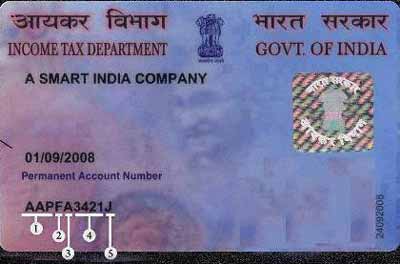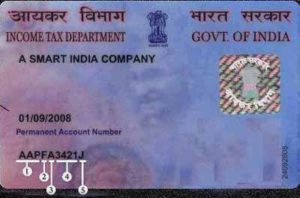
What is pan No?
PAN, or permanent account number, is a unique 10-digit alphanumeric identity allotted to each taxpayer by the Income Tax Department under the supervision of the Central Board of Direct Taxes. It also serves as an identity proof. PAN is mandatory for financial transactions such as receiving taxable salary or professional fees, sale or purchase of assets above specified limits, buy mutual funds and more.
The primary objective of PAN is to use a universal identification key to track financial transactions that might have a taxable component to prevent tax evasion. The PAN number remains unaffected by change of address throughout India
PAN is a 10 digit alpha numeric number, where the first 5 characters are letters, the next 4 numbers and the last one a letter again. These 10 characters can be divided in five parts as can be seen below. The meaning of each number has been explained further.

pan card
How it is allotted ?
1. First three characters are alphabetic series running from AAA to ZZZ
2. Fourth character of PAN represents the status of the PAN holder.
•C — Company
• P — Person
• H — HUF (Hindu Undivided Family)
• F — Firm
• A — Association of Persons (AOP)
• T — AOP (Trust)
• B — Body of Individuals (BOI)
• L — Local Authority
• J — Artificial Juridical Person
• G — Government
3. Fifth character represents first character of the PAN holder’s last name/surname.
4. Next four characters are sequential number running from 0001 to 9999.
5. Last character in the PAN is an alphabetic check digit.
Nowadays, the DOI (Date of Issue) of PAN card is mentioned at the right (vertical) hand side of the photo on the PAN card.
why to get a PAN No ?
For payment of direct taxes
To file income tax returns
To avoid deduction of tax at higher rate than due
To enter into specific transaction such as:
(a) Sale or purchase of immovable property valued at Rs 5 lakh or more
(b) Sale or purchase of a vehicle other than a two wheeler
(c) Payment to hotels or restaurants an amount exceeding Rs 25,000 at any one time
(d) Payment in cash an amount exceeding Rs 25,000 in connection with travel to any foreign country
(e) Payment of an amount of Rs 50,000 or more to the Reserve Bank of India for acquiring bonds
(f) Payment of an amount of Rs 50,000 or more to a company or an institution for acquiring bonds or debentures
(g) Payment of an amount of Rs 50,000 or more to a company for acquiring shares
(h) Any mutual fund purchase
(j) Deposit exceeding Rs 50,000 with any single banking institution in 24 hours.
(k) Payment exceeding Rs 5 lakh for purchase of bullion and jewellery
















